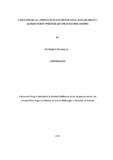| dc.description.abstract | This project looks at the various moral guiding principles and responses have been
developed as an attempt to respond to existing environmental concerns. As a starting point it
examines anthropocentrism, biocentrism and Ecocentrism. It avers that part of the reason
why we experience environmental challenges is because of the divisions between humans
and nonhumans created through anthropocentrism and between living and nonliving brought
about by biocentrism. The project further observes that while ecocentrism has attempted to
resolve the problem through the numerous ecocentric philosophies such as deep ecology,
ecological models, eco-psychology, elemental philosophy, non-disjunctive approach,
ecofeminism, transpersonal ecology and ecopsychology; there is still more that needs to be
done in unifying this ecocentric theoretical approaches as an attempt to offer a theoretical
solution to environmental sustainability. The objectives of the study are: to make a critical
examination of Whitehead‘s Metaphysics; to demonstrate the implications of Whitehead‘s
Metaphysics on environmentalism; and make inferences on how process philosophy may be
applied to environmentalism. Due to the human impact on the environment through: carbon
dioxide emissions, both industrial and agricultural, water vapor, overgrazing, and thermal
pollution, diversion of fresh waters into oceans, affecting its salinity and freezing point,
deforestation; the need to have further study on the justifications for environmental
sustainability cannot be overemphasized. Humans are negatively changing both their
environment and climate. This study departs from the point that despite the existing
ecophilosophical approaches none of them on its own really achieves what ecocentrism set
out to achieve which is having a sustainable environment. The study therefore seeks a whole
inclusive metaphysical approach in addressing environmental sustainability efforts. In other
words a metaphysical approach to environmental sustainability which is a postulation from
Whitehead‘s process philosophy is an attempt by this study to find a unity of purpose by all
ecological theories on environmentalism. In its findings therefore this study holds that in
and through process philosophy, the study institutes a unity among equal beings that are
unified by the elements that contribute into their make up in a metaphysical unity explained
by the principles well demonstrated by process philosophy. A critical examination and study
of Whitehead‘s process philosophy is therefore demonstrated as necessary in order to
establish justification for the paradigm in which we will have a nature centered approach to
the environment and hence achieving its sustainability. | en_US |



